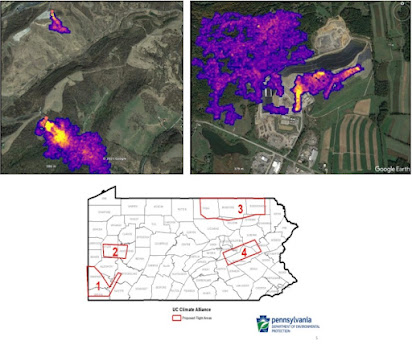Also on the agenda are presentations on proposed EPA regulations to reduce methane emissions from oil and gas facilities and methane fees included in the federal climate and energy “Inflation Reduction” act.
Methane Research Study
DEP, in collaboration with Carbon Mapper, Inc. and the U.S. Climate Alliance, conducted a research study in May 2021 to better understand the capabilities of airborne methane detection technology and to gather data on methane emission sources and rates.
The study evaluated the effectiveness of Carbon Mapper's airborne technology as a methane emission data measurement tool to detect methane-emitting sources and measure their corresponding emission rates.
The data obtained by Carbon Mapper was used to evaluate and compare methane emissions across different facilities and industries across Pennsylvania and reduce emissions at a dozen facilities.
Videos: Introduction To Carbon Mapper Technology; Making Methane Visible For Action.
The overflights were conducted in four target county areas: 1- Washington, Greene, part of Fayette; 2- Armstrong, Butler; 3- Tioga, Bradford, Susquehanna; and 4- Schuylkill, parts of Northumberland, Columbia, Luzerne.
During the flights 153 total methane plumes were detected from 91 individual sources, including oil and gas facilities (63 sources), coal mines (18 sources) and landfills (9 facilities).
The analysis shows total emission rates were led by oil and gas facilities at 53,000 kg/hr; coal mines were second at 37,440 kg/hr; and landfills third at 3,610 kg/hr.
In terms of average emissions rates, coal mines came in first at 1,890 kg/hr; oil and gas facilities second at 840 kg/hr and landfills third at 400 kg/hr.
Twelve facilities instituted mitigation strategies to combat methane emissions which led to an approximately 10 percent reduction in emissions from oil and gas, coal mining and landfill facilities that were part of this study.
Click Here for a copy of DEP’s presentation. The presentation was made by Sean Nolan, Air Quality Monitoring Division, 717-772-2303 or senolan@pla.gov.
Public Comments
If anyone is interested in providing public comments during the meeting, they must sign up to provide comments prior to the start of the meeting by emailing the AQTAC Liaison at: RAEPAQTAC@pa.gov.
The meeting will be held in Room 105 Rachel Carson Building in Harrisburg starting at 9:15 a.m. Click Here to join the meeting via Microsoft Teams. Meeting ID: 211 298 172 936 Passcode: o4hctu Or by telephone: +1 267-332-8737 ID: 857 731 879#
Visit DEP’s Air Quality Technical Advisory Committee webpage for available handouts and presentations. Questions should be directed to John Tissue at jctissue@msn.com.
(Photos: top- oil & gas, coal mines; landfill; map of target areas.)
Related Articles:
Related Articles This Week:
-- Conventional Oil & Gas Well Owners Haven’t Filed Annual Production/Waste Generation Reports For 61,655 Wells; Attorney General Continues Investigation Of Road Dumping Wastewater [PaEN]
-- Senate Committee Meets Feb. 27 On Decommissioning Solar Energy Facilities, Limiting 1 Use Of PFAS Chemicals, Resolution Calling For Restart Of Keystone XL Pipeline [PaEN]
-- Guest Essay: Forestal Or Foresee - The Energy Transition And The Pennsylvania Legislature - By Ralph Kisberg, Responsible Drilling Alliance, Lycoming County [PaEN]
-- Scranton Times Editorial: Abandoned Oil & Gas Wells, Abandoned Responsibility [PaEN]
-- PA Supreme Court Sides With Citizens, Landowner Not Sunoco Pipeline On Reimbursing Legal Costs For Lawsuits Won By Citizens [PaEN]
[Posted: February 23, 2023] PA Environment Digest


No comments :
Post a Comment